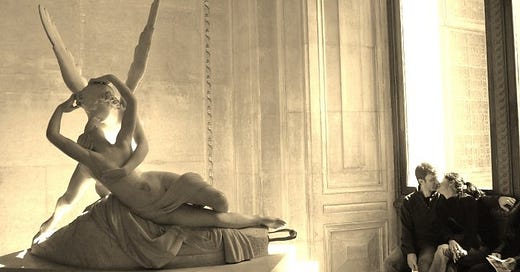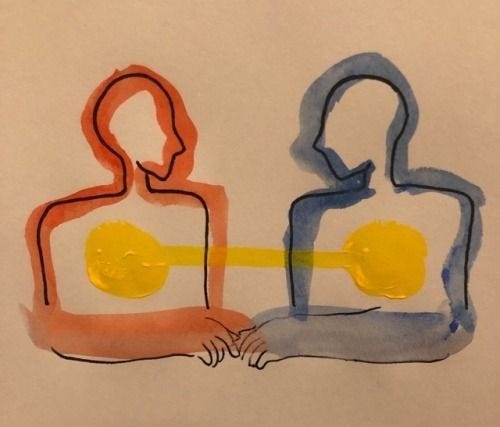plato's symposium; on relationships, intimacy and love
a.k.a dissecting that time a bunch of philosophers sat around drinking wine and waxing poetic about love.
I do not know another emotion as captivating and controversial as the one we call love. Sometimes, when I’m feeling particularly cynical, I worry my fascination with it eclipses reality. That was until I found Plato’s Symposium, in which some of our favourite philosophers spend eighty pages dissecting the topic further than I’ve ever tried. If they could talk so passionately and at length about this, I have no qualms about dedicating so much thought and space to love. This short retelling sparked so many thoughts, discussions I’ve had with myself, conflicts and this week I would love to share them with you.
If you’re unfamiliar with the subject matter, the story describes what happened at a dinner party where Socrates, Aristophanes and other philosophers make speeches intended to praise Eros. (the god of love and sex). From them comes a myriad of interpretations of love, its forms and even its purpose. For this post, I will pick out two speeches and talk about what stood out to me and why, as well as my own interpretations.
Soulmates, compatibility and sex as an aide or hindrance ?
And when one of them meets with his other half, the actual half of himself, whether he be a lover of youth or a lover of another sort, the pair are lost in an amazement of love and friendship and intimacy, and one will not be out of the other’s sight, as I may say, even for a moment: these are the people who pass their whole lives together; yet they could not explain what they desire of one another. For the intense yearning which each of them has towards the other does not appear to be the desire of lover’s intercourse, but of something else which the soul of either evidently desires and cannot tell, and of which she has only a dark and doubtful presentiment. - Aristophanes’s Speech
In Arstophanes’ speech he takes us through the origins of mankind and the creation of soulmates. In summary, we were once circular beings with four legs and four arms. We inevitably annoyed the Gods with our hubris and callous behaviour and were reprimanded by being split in two, destined to crave our other half.
When the soulmates eventually found themselves, they were so lost and consumed by this all encompassing love that they died in each others company ,starving, unable to live life and carry out other tasks. It was only the introduction of sex that allowed them to carry on with their lives (making sacrifices to the Gods and all that), having found each other. There’s two ways we can interpret this; sex helped them by freeing them or it blocked them from experiencing a great love. I spent three hours discussing Plato’s Symposium ,amongst other things, with a friend yesterday and a lot of our conversation was around the place and function of physical intimacy in romantic relationships. (inspired of course by this speech). We couldn’t come to a conclusion but here are some of the things we touched upon.
sex (physical intimacy) as an aide
It is important note that this story left no room for nuance. Aristophanes does no qualify physical intimacy. Of course it can take all sorts of forms, some better for participants and some worse. It is unquestionable that physical intimacy can provide an additional method for partners in a relationship to express their feelings. There’s a reason physical touch is one of the love languages. Outside of intimacy in relationships I think of the many conversations surrounding hookup culture. Whilst hookup culture throughout history has historically been criticised, there are aspects I believe can positively impact society in the long term. One of these is the promotion of better communication. When done in a safe environment it promotes honest and candid discussions around boundaries, preferences and sex in general. To my recollection, whilst reproduction is mentioned, Arstophanes does not try to claim that the sex exists only for the prolonging of the human race. He leaves the purpose and form very much up to your interpretation. However, for those who acknowledge the pleasure aspect of physical intimacy, it can definitely be seen as an aid and not hindrance.
sex (physical intimacy) as a hindrance
I think one thing we can all agree on to some degree is that physical intimacy sometimes creates a facade of connection, or at least that the connection is richer than it is. We even use it measure the success of dates especially first dates. “How was the date, did you guys kiss ? How great was it on a scale of one to ten ?” I’ve seen so many Tiktoks of people seeking advice desperately because they don’t want to be perceived as naive when they come to have their first kiss. As if it isn’t an experience almost everyone goes through. The judgment and embarrassment around being inexperienced, whilst I understand it, is one of society’s flaws. When we focus on the physical side of things we can lose focus on other priorities such as how complimentary you are, your morals, your belief systems and so on. In part I think we do this because it’s easier to prioritise / dissect something as tangible and present as physical intimacy than it is the ‘grand ideas’ of political ideologies, faith and morals. Recently, I saw a relationship therapist on Tiktok encouraging people to implement a three month no kissing rule in their relationship, and whilst I am in no way promoting abstinence, I think it would do us good to think about why we would otherwise be so opposed to letting physical intimacy take a back seat in dating.
compatibile vs complementary
If you’re as chronically online as I am, I doubt you’ve escaped the many conversations and think pieces about compatibility in relationships. Some place great emphasis on it whilst others are indifferent. I am among the latter, and this metaphorical explanation for soulmates aligns with my reasons for why. When we think of compatibility between two people, we immediately think of matching qualities and interests. Partners complain about their significant other being disinterested in sports, or not sharing their overwhelming love for manga, writing out a potential connection because it does not seem immediately possible to share your time with someone. Personally, I think judging a relationship with this interpretation of compatibility is a naive approach and an easy way to write something off without admitting to yourself the other problems within the relationship. (some times, obviously this is a massive generalisation). Coming back to this idea of being one half to a whole, two identical halves cannot belong together. Their parts could be identical and yet sewn together they would not resemble their original form. This is why I prefer to think of relationships under the guise of completion instead of compatibility. When you’re complementary, it’s as though you can work in sync, you may be different but you understand each other and you align where it counts.
Let me be clear, I still believe it is important to be on the same page about political ideologies, children and the main important topics, especially politics, as we interact with it everyday.
complementary- mutually supplying each other’s lack. complementary things are different from each other but make a good combination.
Being your best self in a relationship, and what causes us shame ?
I say then that a man in love, if discovered doing something shameful, or suffering it from another and failing through cowardice to defend himself, would not be so pained at being seen by his father or friends or anyone else as by his beloved. We see this same thing too in the beloved, that it is especially before his lovers that he feels shame when seen in something shameful. If then there were some device so that a city or an army might be made up of lovers and their beloveds, it is not possible that they could govern their own affairs better than by abstaining from all things shameful and vying for honour among themselves; fighting side by side, men of this sort would be victorious even if they were but few against nearly all mankind.
The first speech of the day came from Phaedrus, who touched on something we can all intuitively agree on. We do not want to disapoint our partners, we avoid participating in shameful activity in front of them. I’ve seen countless examples of people talking about the worst thing to hear in an argument: I’m not angry I’m just disappointed. But to what extent do we actually practice this, what lengths do we take to avoid shaming ourselves in relationships ?
There are the obvious things that come to mind, cheating, lying and abuse. Society has agreed those are the worst things u can do in a relationship. To some if they stay clear of those offences they’re on the right track, but what about the other behaviours that may not be so extreme. Take for example, coming home from work and projecting your bad day unto your partner, doing something to make them suffer and using them as a surrogate for your emotional labour. If shame is defined as “a painful feeling of humiliation or distress caused by the consciousness of wrong or foolish behaviour” , surely this too would be something we strive to avoid. Obviously, one could argue that projection is often unconscious and whilst I agree I feel as though it portrays my thoughts well enough. Disrespecting your partner in front of others, hiding your partner, diminishing their feelings, communicating or acting in bad faith, are these not actions we as humans so often take that should cause shame in us. And yet they are displayed time and time again. Interestingly enough, I am reminded of something Nikki Giovanni said in a conversation with James Baldwin. She told him that she’d rather her partner lie to her. It sounds absurd at first but she elaborates. She acknowledges that her partner, knowing they do not feel ok or up to par, goes out into the world and lies to most people. We do it too, when people ask if we’re alright, we seldom tell them the truth. It is only when her partner comes home that he is honest but unleashes his emotions in such a way as I mentioned above. Nikki Giovanni expresses how she wishes her partner would treat her with the same courtesy these strangers in their life are afforded. We lie to others so not to affect them negatively but at home we handle matters in such a callous way. Whilst I will always advocate for honesty in all aspects of relationships and I believe there are ways to communicate ‘negative’ emotions without engaging in harmful practices, I resonate with some of what Nikki Giovanni touches upon. We take love or the connection in relationships for granted because we believe so deeply in it being somewhat unconditional and we forget to hold ourselves to these higher standards Phaedrus mentions in the first speech.
I hope you enjoyed this little exploration into some of Plato’s work. The greatest part of this is at the end of the day these are just questions posed. Whilst I may have certain opinions, I don’t expect everyone to agree with me, or even the philosophers themselves. Plato himself may not have agreed when writing this book. It is speculated that he often used Socrates as his mouthpiece despite there being many characters in Symposium.
As per usual, please feel free to comment any thoughts, opinions or discussion points in the comments.
See u next week. Fridays between 5-6pm GMT and 9-10pm PST






